John Veverka & Associates
Main menu:
- Home Page
- Our Range of Services
- Interpretive Coaching
- Interpretive Planning
- Interpretive Plan Outline
- Interpretive Training
- John Veverka Resume
- NEW Advanced Interp. Text Book
- InterpNEWS
- Library
- JVA NEWS, Courses and Updates
- Certificates
- Planning/Design of Interpretive Panels
- Interpretive Writing
- Interpretive Writing Course
- Interpretive Trails Course
- Interpretive Panels Course
- Introduction to Heritage Interpretation Course
- Interpretive Planning & Design of Marketing Brochures Course
- Training for Interp. Trainers
- Interpretive Exhibits Course
- Interpretive Master Planning Course
- Interpretive Planning for Scenic Byways.
- Critiquing and Coaching Interpretive Staff
- Advanced Interpretive Planning
- Interpretive Training Center Course Catalogue
- Interp. for International Visitors course.
- Interpretive Exhibits Evaluation
- Interp. Center Feasibility Analysis Course.
- Interp. for Commercial Tour Providers
- Interpretive Researchers Guide for Visitor Studies
- Interp. Planning for Historic Homes
- Heritage Interpretation Training Center
- Interpretive Planning for Botanical Gardens
- An introduction to planning and presenting live interpretive programs and tours for Museum/Heritage Site Docents and Volunteers.
- Developing Marketing Plans for Heritage & Tourism Sites and Attractions
- Interpretation Book Store
- Heritage Interpretation Resource Center
- Interpretive Planning for Historic Farms
- Developing Successful Partnerships
- Developing Interpretive Outreach Programs
- Community Interpretation Planning
- Interpreting Gravestones and Historic Cemeteries
- Using Interpretation to Accomplish Management Objectives.
- An Interpreters Guide for Survival Economics.
- Innovative Strategies for Interpretive Media and Services Planning.
- A Curators Guide for Developing Gallery Tours.
- Advanced Interpretive Writing - Technical Publications
- Advanced Interpretive Services for Managers, Supervisors, Team Leaders and Sr. Staff.
- Advanced Interpretation for Chiefs of Interp. - Interpretive Managers - Regional Interp. Specialists
- Interpreting Critical Issues.
- Developing Commercial Interpretation for Resorts, Cruise Ships, Campgrounds and Tourism Attractions.
- Planning and developing a new commercial tour guiding business.
- Interpretive Evaluation, Visitor Studies and Site Assessment Center
- The Center for Interpretive Planning Advancement & Excellence.
- Developing Requests for Proposals (RFPs)
- Planning and Facilitating Focus Workshops
- Planning for Interpretive Experiences
- 40 Years a Heritage Interpreter
- Interpretive Techniques - The Rest of the Story Course
- Certified Professional Interpretive Planner Certificate
- Certified Professional Interpretive Program
- Certified Professional Interpretive Writer certificate program.
- Visitor motives for attending interpretive programs.
- Exhibit Rehab Course
- Developing Training Workbooks & Manuals
- Planning for Railroad Museums and Sites.
- Climate Change Interpretation Course.
- When there's nothing left but the story - interp. storytelling.
- Interpreting Legends Myths and Fables
- InterpSHARE - Seminars 2022
- Interpreting Invasive Species
- Interpretiing Edible Insects
- Interpretaive Planning for Climate Change
- HITC Climate Crisis Resource Center
- PUP Members Only
- Starting a new Interp Consulting Business
- Panels 4 Week Course
- Interpretive Writing - 4 Week Course
- Marketing - 4 Week Course
- Intro to Interpretation - 4 Week Course
- Interp Climate Change - 4 Week Course
- Exhibit Rehab 4-Week Course
- Level 1
- Johns Interpreters Blog
- John Interpreters Blog 2
Interp Climate Change - 4 Week Course
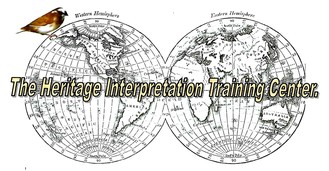
Heritage Interpretation Training Center
Interpreting Climate Change to your visitors - 2022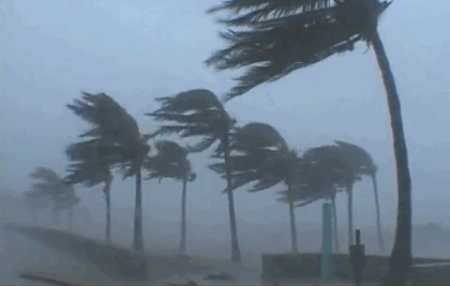
More hurrianes and dangerous weather coming.
Planning, designing and presenting interpretive programs, tours,
Exhibits and self-guiding experiences focusing on climate issues.
A 4-Week Course with live mentoring.
28th of February - 25th of March 2022
Course Tuition $200.00
Climate change and global warming issues are quickly reaching a critical level affecting each of us as well as the world every day. From enabling extreme weather, sea level increases from glacial melting and flooding, affecting farming and food production, and the increasing health risks such as asthma in children, we, as interpreters, interpretive organizations and agencies, museums and zoo educators have to do a better job in interpreting climate issues to our visitors. We need to do this particularly at the grass root level, for our own visitors raising awareness of problems and de-bunking myths.
It is the focus of this course to help empower you to be an effective climate change educator, community interpretive resource and developer/presenter of interpretive programs, media and services to inspire your visitors to learn more about how climate change will, or currently does, affect them and their families personally, and inspire them to take active steps at home to help reduce the affects of climate change.
Course learning experiences and content will focus on:
- How to help visitors and folks in your community understand the affects of climate change the can see and experience today.
- Understand the affects of climate change to them personally.
-Understand different ways they can help mitigate climate changes on a personal or community level.
- Understand the affects of climate change on national and international people across the globe
This 4-Week course on how to interpret climate change issues to your visitors has been developed and will be mentored/coached by Prof. John Veverka - Director of the Heritage Interpretation Training Center and with 40 years of experience as an interpretive planning and training consultant.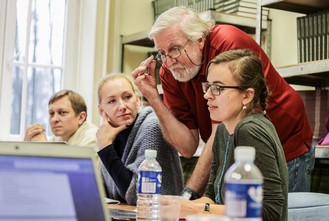
Heritage Interpretation/tourism class - Lighuania University.
Course participants will receive:
- Interpretive Master Planning Text Books
- An interpretive services resource library.
- Extensive climate change resource Handouts.
- Weekly zoom chats with Prof. Veverka
- A Certificate of Completion from the Heritage Interpretation Training Center
with two (2) CEU unit credits.
Prof. Veverka will offer weekly ZOOM meetings and discussions. You can also contact Prof. Veverka at any time via e-mail or SKYPE to address any personal project questions at jvainterp@aol.com.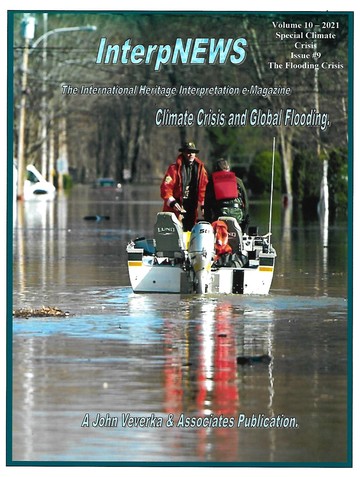
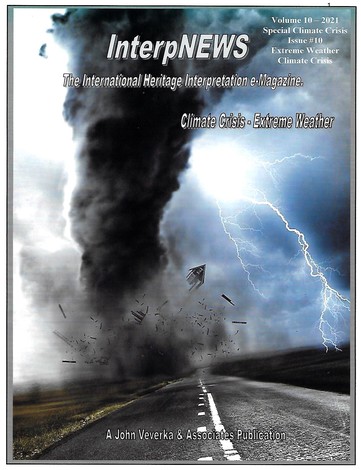
Some of our Climate Change Resource Center publications that are included in the course.
Due to providing adequate time for Prof. Veverka to provide mentor/coaching to participants working on their projects, this course will be limited to 10 participants.
Course Registration
- Pay the course tuition via the course web site PayPal button at the bottom of the web site
page.
- Prof Veverka will send you by e-mail initial course text books and resource materials.
- We will have a course orientation meeting via ZOOM for participants on the 28thst of Feb -
time to be decided based on participant time zones.
Course Weekly Content Structure
Week One
Unit 1: Better understand the science and research into climate change and global warming.
Unit 2: Review interpretive principles and techniques you can use to interpret climate change issues.
Unit 3: Review studies and resources in how climate change affects fires and extreme weather.
- Weekly ZOOM discussions with course instructor.
Week Two
Unit 4: Review studies and resources in how international rain forest and forest clearing and burning to create agricultural fields can affect our climate today and into the future.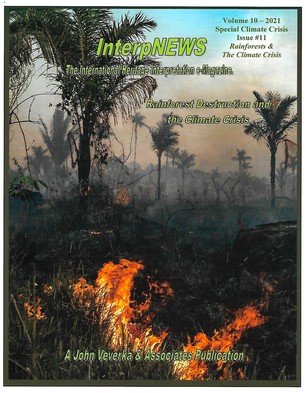
Unit 5: Understand how glacial melting is and will continue to affect sea level rise, and that affect (currently and in the future) on coastal cities and communities.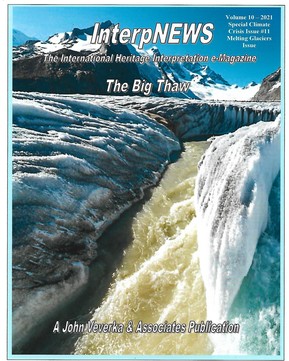
Unit 6: Review how climate change may be affecting your local parks, farmland, natural habitats, and weather issues today and possibly into the future (Your personal focus on developing interpretation address local issues).
- Weekly ZOOM discussions with course instructor.
Week Three
Unit 7: Developing your theme(s) and interpretive objectives you would like to have climate change interpretation to address and illustrate.
Unit 8: Understand your audience (market groups - local, tourists, school groups, etc.).
Unit 9: Develop planning for the kinds of interpretive media you would like to use to illustrate your interpretive theme and accomplish your objectives (live walks or hikes, self-guiding media, museum or interpretive center exhibits, interpretive panels, web site with on -line library, outdoor demonstration areas, and other interpretive services).
- Weekly ZOOM discussions with course instructor.
Week Four
Unit 10: Develop your personal, agency or organizations climate change interpretation implementation strategy and phasing priorities.
Unit 11: Do it - be prepared with the FACTS and teaching aides - get feedback - are your objectives being accomplished?
Unit 12: Keeping current and support organizations to help you keep improving and updating your work and media development.
- Final ZOOM discussion for course completion and what's next for you?
Should you have any questions feel free to contact me:
Prof. John Veverka
jvainterp@aol.com
skype: jvainterp
Tuition payment and registration: